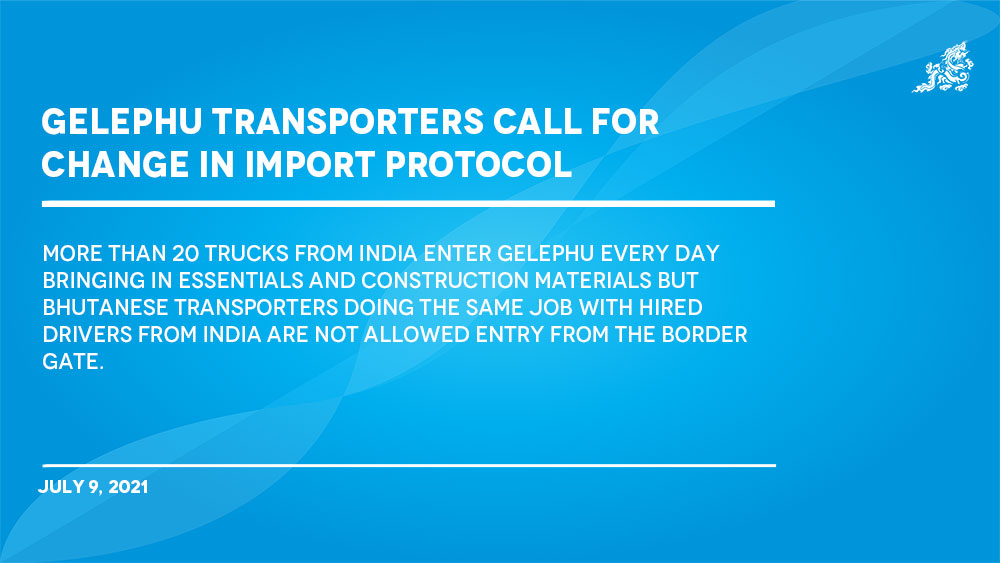Nima | Gelephu
More than 20 trucks from India enter Gelephu every day bringing in essentials and construction materials but Bhutanese transporters doing the same job with hired drivers from India are not allowed entry from the border gate.
Contractors and transporters from Gelephu transported about six trucks of construction materials and essentials on two different occasions recently but the trucks were stopped at least for two days before allowing into Gelephu.
This is because the existing Covid-19 protocol allows only the trucks involved in the export of boulders and Indian trucks to transport import consignments in Gelephu.
While the operating procedure has kept local truckers jobless for over a year, contractors and enterprise owners in Gelephu have to pay heavy transportation charges.
An exporter from Gelephu said that it was difficult to understand the protocol at the border gate. “Trucks from India are allowed to transport goods and materials but not the local trucks. Grocery and essential items are transported only by Indian trucks,” he said.
He added that allowing local transporters to convey imported goods would help them sustain themselves in the face of the pandemic. “It is becoming difficult for them to sustain now. The transportation charges for Indian trucks are too high and it has hiked the price of goods,” said the exporter.
Agents importing red bricks from India also have to register their trucks for the boulder export and should be involved in the trade so that they would be able to transport bricks while returning to the mini dry port (MDP) in Gelephu.
This has confused some brick agents in Gelephu who are facing a tough time meeting the demand for the red bricks. “The price of the brick is also on the rise because of the increased transportation charges.”
The owner of R.K. enterprise, Muna Chhetri, said that she stopped deploying her trucks for boulder export in November 2020 after exporters denied payment for the trucks.
“It was also difficult for the trucks to reach the MDP on time for registration. The public has to bear the loss at last. The price of the materials has increased,” she said.
She added that Indian trucks mostly did all business in the town now. “They transport all essential items. It would help us if we are allowed to bring in bricks without having to carry boulders. Keep the export as it is,” Muna Chhetri said.
It was learned that the trucks involved in boulder export were also not allowed to carry return loads in the initial days. It’s been around 10 days since the task force allowed trucks involved in boulder export to carry return loads, mostly bricks.
Over 20 trucks leave for Bangladesh every month during the peak export season from Gelephu. With the protocol not allowing return loads, the trucks return empty after dispatching the consignment to Bangladesh.
“If we were allowed to bring loads when we return, we would be able to save the one-way expenditure. Right now the spending remains the same but there are not many returns. Money remains in the country if we allow local transporters,” said another exporter.
He added that the local truckers would earn at least Nu 30,000 and help them sustain themselves.
Essentials and grocery items are mostly imported from Siliguri and an Indian truck charges Nu 1,200 per metric tonne while local transporter bring the same load at Nu 1,000 per MT.
The owner of Dhendup Mines and Mineral export, Lobzang Tshering, said that negotiating with the transporters in India would be better if we have at least two Bhutanese trucks in Jaigaon.
“When it’s only Indian trucks transporting the goods, the rates are charged too high. It’s not a convenient time to have our drivers working. If truck owners know drivers from India, we could keep trucks with them,” he said.
Transporters from India charges over Nu 55,000 per truck to carry a load from Jaigaon till Gelephu while a local transporter could reach the same consignment to Gelephu at Nu 32,000.
“The rate asked by local transporter is also high compared to the normal rates but it’s better compared to the charges demanded by the transporters from India,” said Lobzang Tshering.
Transporters and the private firms from Gelephu said that the existing procedure was confusing and not uniform. They claim that some local trucks driven by Indian drivers were allowed to transport the goods from India.
Exporters say that the transportation charged for Indian trucks was cheaper than local trucks before the State-wise lockdown was implemented in India.
The dzongkhag Covid-19 task force discussed the issue last week and forwarded it to the Southern Covid-19 task force to come up with suitable solutions.
Dzongdag Lobzang Dorji said that the transport of goods was allowed for the trucks involved in boulder export, as the trucks had to return to Gelephu anyway and for the Indian trucks ferrying essentials and grocery items.
Bhutanese truck owners have deployed drivers from India to pick up the boulder export business that couldn’t be continued as expected, having to pass through two Indian States to reach the market.
The restriction applied only for the Bhutanese trucks operated by foreign workers. It would be best to have Bhutanese driving their trucks. The task force facilitated in bringing trucks left in Jaigaon or Dathgari.
“This was the position adopted earlier itself and changing it suddenly is not possible,” said the dzongdag.
A task force member said that the existing system monitored and implemented by the frontline workers served the purpose well. “We are risking lapses at the gate if we are adding more works,” an official said.
Edited by Jigme Wangchuk


